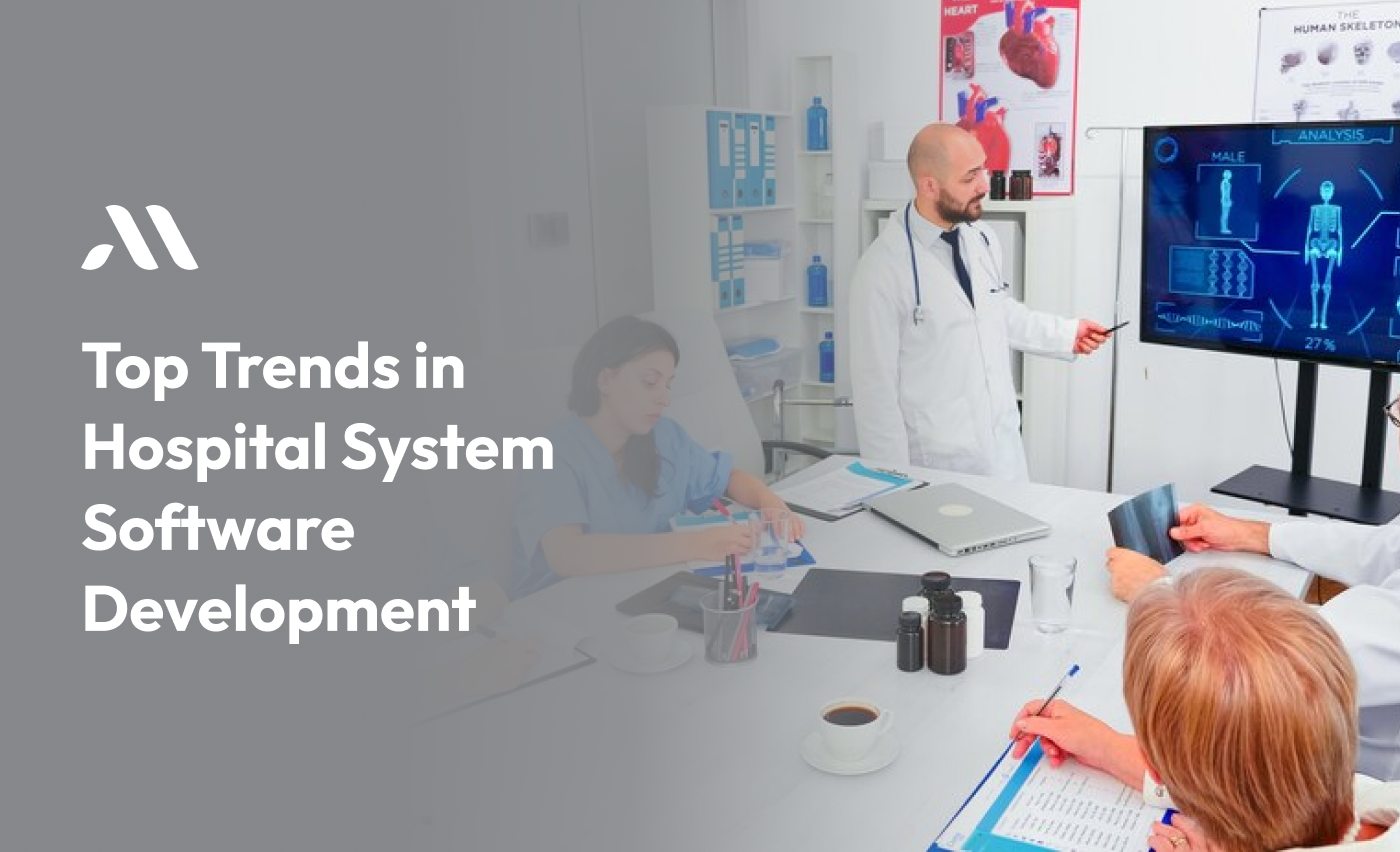Hospital system software development has transformed healthcare, making it easier for doctors, nurses, and hospital staff to manage patients, data, and resources. In this blog, we’ll discuss the top trends in hospital system software development and how they impact healthcare businesses.
1. Cloud-Based Solutions
One of the biggest trends in hospital system software development is moving everything to the cloud. Hospitals now store and manage patient data, appointment schedules, and billing information online. Cloud solutions allow healthcare systems to access important data anytime, from anywhere. This also means less paperwork, reduced costs, and quicker patient care.
Many hospitals are adopting SaaS development (Software as a Service) models to make cloud-based solutions even more effective. Instead of buying expensive software, hospitals can pay a SaaS Development Company to use their software over the Internet.
Benefits of Cloud-Based Solutions
- Access data 24/7
- Improve data security
- Save on infrastructure costs
- Enable remote monitoring of patients
Remember: Cloud technology helps hospitals focus more on patient care and less on paperwork.
2. Artificial Intelligence (AI) and Machine Learning (ML)
Another key trend in hospital system software development is the use of AI and ML. These technologies help analyze massive amounts of healthcare data quickly and accurately. For example, AI can help doctors diagnose diseases faster by analyzing medical images, like X-rays and MRIs.
AI-powered hospital systems can even predict patient outcomes and suggest personalized treatments. With this technology, hospitals can improve patient care while reducing costs.
AI in Action
- AI can analyze patient data to find health risks early.
- AI chatbots can answer patient questions, reducing the workload on staff.
- Machine learning can predict patient recovery time, helping hospitals manage resources better.
Tip: Use AI to speed up medical diagnoses and help doctors make better decisions.
3. Telemedicine and Remote Care
The COVID-19 pandemic showed how important telemedicine is for patient care. Telemedicine allows doctors to consult patients remotely using video calls or messaging apps. Hospital system software development now focuses heavily on integrating telemedicine features, making it easy for doctors and patients to connect without being physically present.
Telemedicine is becoming a permanent part of healthcare, helping doctors reach patients in rural areas or those unable to travel.
Why Telemedicine Matters
- Helps patients receive care without visiting the hospital.
- Reduces the spread of infections in healthcare settings.
- Saves time for both patients and doctors.
Statistics show that telemedicine adoption increased by 38% during the pandemic and continues to rise as hospitals realize its benefits.
4. Electronic Health Records (EHR)
Managing patient records digitally is another crucial aspect of hospital system software development. SaaS development has made it possible to store Electronic Health Records (EHR) online, giving doctors and healthcare staff instant access to patient histories, medication records, and test results.
Having all this information available at their fingertips allows doctors to make quicker decisions about treatment plans. EHR systems also reduce the chances of errors caused by manual record-keeping.
Benefits of EHR
- Reduces paperwork and manual errors
- Makes sharing patient information between hospitals easier
- Improves the accuracy of patient data
- Helps in storing long-term patient history safely
Note: EHR systems reduce mistakes and speed up the decision-making process in hospitals.
5. Data Security and Privacy
As more hospitals move their data to cloud-based systems, data security has become a top priority in hospital system software development. Hospitals handle sensitive patient information, including personal details and medical histories. If this data falls into the wrong hands, it could lead to serious problems, including identity theft or medical fraud.
That’s why many SaaS development companies now focus on building software that meets strict security standards. This includes using encryption to protect data, ensuring that only authorized personnel can access it, and regularly updating software to fix any vulnerabilities.
How to Ensure Data Security
- Use encryption to protect sensitive information
- Regularly update software to prevent hacks
- Train staff on data security best practices
Remember: Protecting patient data isn’t just about technology it’s about educating healthcare staff as well.
6. Wearable Devices and IoT
Wearable devices like fitness trackers and smartwatches have become a part of daily life. In healthcare, these devices play a key role in hospital system software development. Wearables can track vital signs such as heart rate, blood pressure, and sleep patterns, sending this data directly to hospital systems. This helps doctors monitor their patients remotely.
The Internet of Things (IoT) connects these devices to hospital software systems, making patient monitoring easier and more efficient. This way, hospitals can keep an eye on patients even when they are at home, reducing unnecessary visits.
IoT in Healthcare
- Real-time patient monitoring
- Collects health data continuously
- Alerts doctors to abnormal readings instantly
According to recent statistics, IoT in healthcare is expected to grow by 29% in the next five years, making it a vital trend in hospital system software development.
Also Read - How To Develop Hospital Management System
7. Customizable Healthcare Solutions
No two hospitals are the same. Each one has its own set of needs, depending on the size of the facility, the services offered, and the patient population they serve. That’s why hospital system software development now focuses on creating customizable solutions. Hospitals can work with a SaaS development company to create software tailored to their specific requirements.
Custom software ensures that hospitals only pay for the features they need, making it cost-effective and efficient.
Tip: Choose customizable solutions that fit your hospital's unique needs to improve patient care and reduce unnecessary costs.
8. Mobile Health Apps
Mobile health (mHealth) apps are becoming an essential tool in healthcare. Patients can now use apps to schedule appointments, access their medical records, or get reminders about medications. Hospital system software development integrates mobile apps to improve patient engagement and streamline communication between patients and healthcare providers.
For example, some apps allow patients to track their health progress and send updates to their doctors, making it easier to manage chronic conditions.
Benefits of mHealth Apps
- Allows patients to stay connected with their healthcare providers
- Improves medication adherence with reminders
- Gives patients easy access to health information
Recent reports suggest that by 2025, the global mHealth app market will reach $236 billion, making it a growing trend in hospital system software development.
9. Interoperability Between Systems
Interoperability refers to the ability of different hospital systems to work together seamlessly. In hospital system software development, it is crucial to ensure that software platforms used by different departments, hospitals, or clinics can share data easily. This reduces delays in patient care and ensures that all healthcare providers have access to the most up-to-date information.
For instance, if a patient moves from one hospital to another, the second hospital should be able to access their medical records instantly. This improves coordination between healthcare providers and enhances patient outcomes.
Importance of Interoperability
- Streamlines communication between healthcare providers
- Reduces duplicate testing and procedures
- Speeds up treatment by sharing patient data quickly
Remember: Interoperability ensures that hospitals work together smoothly for better patient care.
Conclusion
The future of healthcare lies in technology, and hospital system software development plays a crucial role in shaping it. From AI and cloud-based solutions to telemedicine and wearable devices, hospitals are embracing innovative software to improve patient care, reduce costs, and streamline operations.
Looking to improve your hospital's system with the latest software? MicraSol specializes in custom app development for healthcare. From AI to cloud solutions, we create software that helps hospitals run better and care for patients faster. Contact MicraSol today to bring your hospital into the future!
By working with a reliable SaaS development company, healthcare organizations can stay up to date with the latest trends and technologies. As technology continues to evolve, hospitals that adapt to these trends will be better positioned to provide high-quality, efficient care.
FAQS
What is hospital system software development?
Hospital system software development is the process of creating software that helps hospitals and healthcare facilities manage patient care, records, appointments, and billing. It makes it easier for doctors, nurses, and hospital staff to do their jobs more efficiently.
How does cloud technology help hospitals?
Cloud technology allows hospitals to store important patient information, like medical records, online. This means hospital staff can access this information from any location, at any time. It also helps reduce paperwork and makes hospital systems faster and more secure.
What is SaaS development, and why is it important for hospitals?
SaaS stands for Software as a Service. It means hospitals can use software over the internet instead of buying and installing it on their own computers. This saves money and ensures the software is always up to date. Hospitals work with a SaaS development company to get the software they need.
How is AI used in hospital system software development?
Artificial Intelligence (AI) helps doctors and hospitals by analyzing patient data quickly and providing helpful insights. For example, AI can look at medical images like X-rays and help doctors find health problems faster. AI also helps predict patient outcomes and suggest treatments.
What is telemedicine, and why is it important?
Telemedicine allows doctors and patients to talk through video calls or messages without needing to be in the same room. This is helpful for patients who can’t travel to the hospital. Telemedicine became very popular during the COVID-19 pandemic and continues to be an important part of healthcare today.








